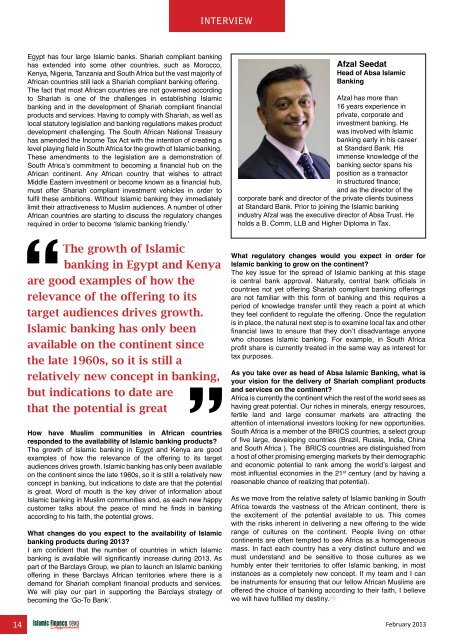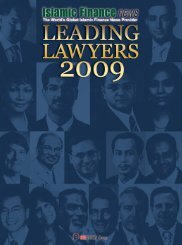View PDF Edition - Islamic Finance News
View PDF Edition - Islamic Finance News
View PDF Edition - Islamic Finance News
You also want an ePaper? Increase the reach of your titles
YUMPU automatically turns print PDFs into web optimized ePapers that Google loves.
interview<br />
Egypt has four large <strong>Islamic</strong> banks. Shariah compliant banking<br />
has extended into some other countries, such as Morocco,<br />
Kenya, Nigeria, Tanzania and South Africa but the vast majority of<br />
African countries still lack a Shariah compliant banking offering.<br />
The fact that most African countries are not governed according<br />
to Shariah is one of the challenges in establishing <strong>Islamic</strong><br />
banking and in the development of Shariah compliant financial<br />
products and services. Having to comply with Shariah, as well as<br />
local statutory legislation and banking regulations makes product<br />
development challenging. The South African National Treasury<br />
has amended the Income Tax Act with the intention of creating a<br />
level playing field in South Africa for the growth of <strong>Islamic</strong> banking.<br />
These amendments to the legislation are a demonstration of<br />
South Africa’s commitment to becoming a financial hub on the<br />
African continent. Any African country that wishes to attract<br />
Middle Eastern investment or become known as a financial hub,<br />
must offer Shariah compliant investment vehicles in order to<br />
fulfil these ambitions. Without <strong>Islamic</strong> banking they immediately<br />
limit their attractiveness to Muslim audiences. A number of other<br />
African countries are starting to discuss the regulatory changes<br />
required in order to become ‘<strong>Islamic</strong> banking friendly.’<br />
Afzal Seedat<br />
Head of Absa <strong>Islamic</strong><br />
Banking<br />
Afzal has more than<br />
16 years experience in<br />
private, corporate and<br />
investment banking. He<br />
was involved with <strong>Islamic</strong><br />
banking early in his career<br />
at Standard Bank. His<br />
immense knowledge of the<br />
banking sector spans his<br />
position as a transactor<br />
in structured finance;<br />
and as the director of the<br />
corporate bank and director of the private clients business<br />
at Standard Bank. Prior to joining the <strong>Islamic</strong> banking<br />
industry Afzal was the executive director of Absa Trust. He<br />
holds a B. Comm, LLB and Higher Diploma in Tax.<br />
The growth of <strong>Islamic</strong><br />
banking in Egypt and Kenya<br />
are good examples of how the<br />
relevance of the offering to its<br />
target audiences drives growth.<br />
<strong>Islamic</strong> banking has only been<br />
available on the continent since<br />
the late 1960s, so it is still a<br />
relatively new concept in banking,<br />
but indications to date are<br />
that the potential is great<br />
How have Muslim communities in African countries<br />
responded to the availability of <strong>Islamic</strong> banking products?<br />
The growth of <strong>Islamic</strong> banking in Egypt and Kenya are good<br />
examples of how the relevance of the offering to its target<br />
audiences drives growth. <strong>Islamic</strong> banking has only been available<br />
on the continent since the late 1960s, so it is still a relatively new<br />
concept in banking, but indications to date are that the potential<br />
is great. Word of mouth is the key driver of information about<br />
<strong>Islamic</strong> banking in Muslim communities and, as each new happy<br />
customer talks about the peace of mind he finds in banking<br />
according to his faith, the potential grows.<br />
What changes do you expect to the availability of <strong>Islamic</strong><br />
banking products during 2013?<br />
I am confident that the number of countries in which <strong>Islamic</strong><br />
banking is available will significantly increase during 2013. As<br />
part of the Barclays Group, we plan to launch an <strong>Islamic</strong> banking<br />
offering in these Barclays African territories where there is a<br />
demand for Shariah compliant financial products and services.<br />
We will play our part in supporting the Barclays strategy of<br />
becoming the ‘Go-To Bank’.<br />
What regulatory changes would you expect in order for<br />
<strong>Islamic</strong> banking to grow on the continent?<br />
The key issue for the spread of <strong>Islamic</strong> banking at this stage<br />
is central bank approval. Naturally, central bank officials in<br />
countries not yet offering Shariah compliant banking offerings<br />
are not familiar with this form of banking and this requires a<br />
period of knowledge transfer until they reach a point at which<br />
they feel confident to regulate the offering. Once the regulation<br />
is in place, the natural next step is to examine local tax and other<br />
financial laws to ensure that they don’t disadvantage anyone<br />
who chooses <strong>Islamic</strong> banking. For example, in South Africa<br />
profit share is currently treated in the same way as interest for<br />
tax purposes.<br />
As you take over as head of Absa <strong>Islamic</strong> Banking, what is<br />
your vision for the delivery of Shariah compliant products<br />
and services on the continent?<br />
Africa is currently the continent which the rest of the world sees as<br />
having great potential. Our riches in minerals, energy resources,<br />
fertile land and large consumer markets are attracting the<br />
attention of international investors looking for new opportunities.<br />
South Africa is a member of the BRICS countries, a select group<br />
of five large, developing countries (Brazil, Russia, India, China<br />
and South Africa ). The BRICS countries are distinguished from<br />
a host of other promising emerging markets by their demographic<br />
and economic potential to rank among the world’s largest and<br />
most influential economies in the 21 st century (and by having a<br />
reasonable chance of realizing that potential).<br />
As we move from the relative safety of <strong>Islamic</strong> banking in South<br />
Africa towards the vastness of the African continent, there is<br />
the excitement of the potential available to us. This comes<br />
with the risks inherent in delivering a new offering to the wide<br />
range of cultures on the continent. People living on other<br />
continents are often tempted to see Africa as a homogeneous<br />
mass. In fact each country has a very distinct culture and we<br />
must understand and be sensitive to those cultures as we<br />
humbly enter their territories to offer <strong>Islamic</strong> banking, in most<br />
instances as a completely new concept. If my team and I can<br />
be instruments for ensuring that our fellow African Muslims are<br />
offered the choice of banking according to their faith, I believe<br />
consulting www.<strong>Islamic</strong><strong>Finance</strong>Consulting.com<br />
www.<strong>Islamic</strong><strong>Finance</strong>Events.com<br />
we will have fulfilled my destiny.<br />
www.<strong>Islamic</strong><strong>Finance</strong><strong>News</strong>.com<br />
www.<strong>Islamic</strong><strong>Finance</strong>Training.com<br />
www.REDmoneyBooks.com<br />
14 February 2013<br />
www.MIFforum.com<br />
www.MIFmonthly.com<br />
www.MIFtraining.com
















